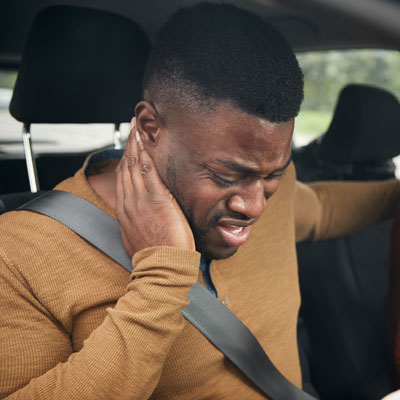 Post-Concussive Syndrome (PCS) is a syndrome typified by the persistence of concussion symptoms weeks or months after the initial head injury. When you think of head injuries, you might only think of blunt force trauma, but there are other ways to injure your brain.
Post-Concussive Syndrome (PCS) is a syndrome typified by the persistence of concussion symptoms weeks or months after the initial head injury. When you think of head injuries, you might only think of blunt force trauma, but there are other ways to injure your brain.
Just like a blow to the head, a whiplash injury can cause the brain to collide with the skull, resulting in injury. We seldom think about it, but our brains are suspended in cerebrospinal fluid, and if the head is subjected to too much motion, the brain can contact the skull.
The Three Kinds of Concussion
- First Degree Concussion: no loss of consciousness, only blurring of consciousness for less than 20 seconds
- Second Degree Concussion: blurring or loss of consciousness lasting between 20 seconds and 2 minutes
- Third Degree Concussion: loss of consciousness exceeding 2 minutes
PCS can even affect people who have only had a first-degree concussion. The condition can have a greater impact on people who have had other head injuries in the past.
Symptoms which are most often present in people with PCS are:
- Headache
- Dizziness
- Insomnia
- Altered mood
- Altered memory/difficulty focusing
- Heightened sensitivity to light and sound
These symptoms are typical for people who are experiencing an acute concussion, but if they continue for weeks or longer, there is a good likelihood of PCS.
Treating Concussions
One of the most important ways to treat the condition is actually education. It is very helpful for a patient to understand the implications and scale of their condition. If someone is not sure what to expect, they may worry more, and anxiety can actually worsen the symptoms of PCS. Knowing that it is a temporary condition will not only help with your short-term peace of mind, but also lessen the risk of further complications.
Anxiety and depression may also be discussed with a psychologist or counselor, and a psychiatrist may prescribe medication to help with these symptoms. Be sure to discuss the concussion with your mental health provider so that they may better meet your needs, which may differ from those of someone who has a more long-term mental health condition.
Headache medication may also be prescribed by your doctor. Different people respond better to different types of headache medication but for PCS the most commonly prescribed are those associated with migraines or tension headaches. Your doctor will guide you in selecting the right medication.
It can be a frightening thing to experience mental changes like those which may occur in PCS, but rest assured that thousands of other people have made it through similar circumstances in the past. With education, appropriate medical care, and the understanding of people close to you, you should be able to transition successfully back to a pre-injury condition. Just be patient with yourself.
